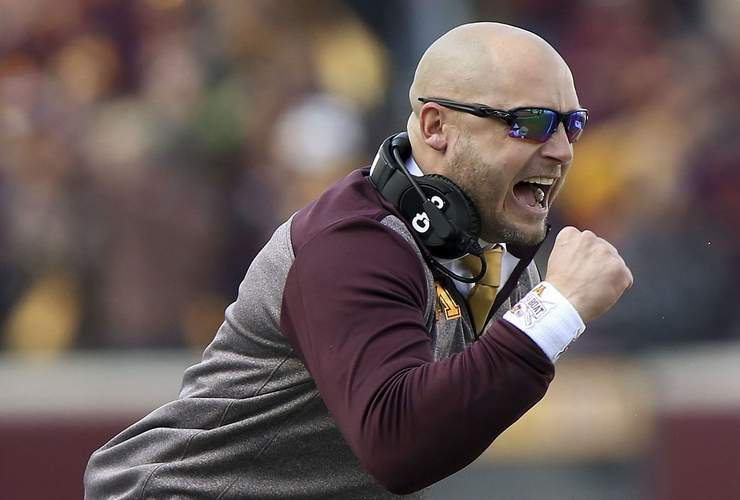
Creating a Winning Culture, Even in Tough Times: Insights from PJ Fleck – Aug 2020
August 27, 2020
There are many articles and books written on the parallels between success in sports and success in business (including an article I wrote back in February on my Kansas City Chiefs winning the Super Bowl!). And I imagine there will be many more articles and books written about how both sports and business had to navigate today’s crisis.

When we were planning PEN’s annual conference for last April, we booked Gophers head coach PJ Fleck as a keynote. Coach Fleck’s success with the Gophers football program has been well documented – the team finished last season with an 11-2 record, winning a New Year’s Day bowl game and securing their first national Top 10 ranking in nearly 60 years. Coach Fleck has created a culture that encourages and expects high performance, but he’s also created a system that produces it. In that respect, he was a perfect choice as keynote speaker for a conference filled with hundreds of leaders across various sectors and industries also focused on achieving excellence in their enterprises.
But COVID-19 forced us to postpone our conference five months (it’s now Sept 23), and reposition most of the content to focus more directly on the challenges we all face. Today, leaders are not only trying to improve performance and reach greater levels of excellence, but indeed just sustain operations and navigate the turmoil. And perhaps that’s where the parallels of leading in sports and in business again intersect, as the Big 10 football season has been postponed until spring, setting in motion all sorts of other changes to which coaches and administrators need to respond.
So while our world is completely different today than it was five months ago, I still can’t think of a better keynote to explore how leaders navigate through challenges – and still create a culture of winning – than Coach PJ Fleck.
My assumption is that higher performing organizations – those that are led by more visionary, more effective leaders – will perform better than the rest. When the dust settles in a post-pandemic world, I’m sure there will be much research on what accounts for the differences between higher performing and struggling organizations during these times. Speaking personally, I am eager to hear Coach Fleck’s insights September 23rd on how building a culture of excellence translates during chaotic times. But today I’m going to jump the gun a little bit and predict some of the things he might say, given what we know about his philosophy in a pre-pandemic world.
This month’s column is formatted as if it’s an interview (but truth be told: this article is not as a result of a real interview!). Instead, it’s a result of combing through years of published articles and actual interviews of Coach Fleck. In doing so, I began to find insights and themes regarding his philosophy on leadership, on building a high performing culture, and on achieving and sustaining winning results. So enjoy this (fabricated) interview and some of the insights you’ll glean from it. And come to the online conference September 23rd to hear the real insights from PJ Fleck – and 26 other speakers – on how to navigate crisis and still achieve performance excellence during these tough times.
Q: To what do you attribute your success?
Fleck: My entire life has been about running into the fire, not away from the fire. I eat difficult conversations for breakfast, and that is why I took this job. For every reason not to take a job, that’s why I took it. That’s the story of my life. I have a crack on my shoulder, not a chip. We are going to find a way to out care everyone else, out give everybody else, and out how everybody else, and that is my commitment.

Q: How do you help your team achieve high performance?
Fleck: You won’t hear me say, good, great or excellent very much at all. You’ll hear me say elite because that’s the type of experience I want our student-athletes to have at the University of Minnesota and nothing short of that. We do ELITE work. We focus on making everything elite. I encourage our players to be the best example of our program – our culture – that they can possibly be. [Every day] I want to see the relentless pursuit to be elite – in every area. We have a vision of winning championships, of being the best. We have a vision of being elite.

Q: So excellence starts with creating a vision of being the best – of being elite – and then focusing on the little things to achieve that vision?
Fleck: Yes. And it’s all about our people. I talk to my team every single day. [In team meetings] 95% of it has nothing to do with football. It has to do with life, and leadership, our culture, and how we can continue to change our best and grow higher.
[When I first got here] the first thing I told [the players] was simple. “Guys, you did not pick me, you did not pick me, but I picked you. And I promise you this: every single day, I’m the solution guy. I’m going to find a solution to make your life elite. Your personal life, your social life, your spiritual life, your academic life, your athletic life. That is my job. And that is what I get paid to do. Remember, I am the ‘how’ coach. I am the character coach. I am the people coach. The head football coach’s job has a lot more to do with people than players.” It’s all about people.Q: So you pick the best people, coach and educate them, and then turn them loose – that’s the secret of your success?
Fleck: Yes. There are three types of teams. On bad teams, nobody leads. Average teams, coaches lead. Elite teams, players lead. And if you want to be successful, you better fail way more than you succeed. Failing equals growth; failure equals quit.
Q: You use the phrase “Row the Boat” all the time – what does it actually mean?
Fleck: Our program is all about “Row the Boat” – [it’s a] “never give up” mantra.

Row the boat is my second son’s life, as I continue to live his life for him [Fleck lost his infant son to a heart condition]. There are three parts to Row the Boat: it involves an oar, a boat, and a compass. The oar is energy you bring to every aspect of life whether it’s socially or professionally. The boat represents sacrifice – what are you willing to give up for something you haven’t had? And the compass is the direction of where you’re traveling to and who you choose to travel with.
[Last season] there’s a lot of people didn’t think we’d beat Penn State. Did we? You bet! Impossible is nothing. Lotta people thought we couldn’t beat Auburn [in the Outback Bowl]. There’s a lot of things that have happened to the University of Minnesota’s college football program – like College Game Day coming to the University of Minnesota for the first time ever! Or 11 wins in a 115 years – that’s pretty special stuff. Just keep your oar in the water and keep rowing that boat!”Q: What makes a good leader?
Fleck: Influencing others in a positive way. Look, being yourself is absolutely critical in this profession. Being yourself makes you stand out, because you’re different! I am not a motivational speaker. I’m a coach and a teacher. The motivation part comes from the culture.
We don’t want followers on our program because everyone is influenced by somebody at some point and, in our definition, that makes you a leader. What you say, do, or how you act always influences others around you – even down to your body language. So I think how you lead has to be clear, precise, and organized. If people have different interpretations of the vision and not one message that they truly believe in, then it becomes the leader’s responsibility to change the vocabulary.
Q: So leadership is about setting a vision, having clear communication, influencing people, and facilitating alignment. Those are tough in normal times, but how do you lead in challenging times – when your team is now virtual and the season is postponed?
Fleck: I know what that’s like with the football team right now, not being around [the players] – having to [lead and coach them] virtually. Having to find a way to get them to grow every single day – mentally, physically, emotionally. We’re communicating with each other every day and forming [plans] on how the Gophers are going to do this.

Q: Just like many businesses, you’ve had to make changes to keep the team healthy and safe during COVID. How are you doing that?
Fleck: We…make sure we could spread everybody out. When they’re standing around at individual and different drills, they’ve got to be 6 feet apart. Everybody has their masks…We have larger meeting rooms. We cleared out our players’ lounge and use that as a meeting room now. We’ve got smaller lift groups. We’ve got multiple practice fields. We split our team up into different groups that are practicing at different times. We’ve got two locker rooms…we are going to do things at a snail’s pace to make sure that our student-athletes are safe.
Q: How do you keep your team focused and resilient during these tough times?
Fleck: A lot has changed in recent weeks, but what hasn’t changed is our commitment to our [team and our] community. We’re going to need to row together, so we can all get back to work. We’re certainly in uncharted waters, but we know when times get tough, we put our oar in the water and row.
What I want them to do is focus on now, mentally emotionally. Now. This virus is so humbling, and each day, there’s more and more knowledge that if you start thinking three, four weeks ahead, it’s going to blow your mind…This year, when you look at it, my job is going to be able to make our team the healthiest team on the field, the safest team on the field, and the most prepared team on the field. But football is going to [take a] backseat to the safety. Period.
Q: It seems like getting through these tough times might be like getting through tough games?
Fleck: [We focus on being] the most mentally tough football team out there. The most mentally tough. The most mentally tough on how you do things – HOW you do it. Let the other guy get tired.
Q: How are you going to shift plans now that the season is delayed until spring?
Fleck: The more time we have with [the players] without playing only helps the depth of this team, and I’m excited about that. [We’ll work on the little things.] If your pinkie toe step was out of line or you stepped 7 inches instead of 6, we’re going to address it and find a way to fix it. There will be another season. At some point, they’re going to open those gates, and we’re going to run through, and whatever comes throughout those gates, we’ve got to be ready for. So we’ve got to start preparing now. So if there’s a winter season or spring season, fall season, we’re ready for it.
Q: To close, what have been the most significant things you’ve learned in your time as head coach – things that could help other leaders in other types of organizations?
Fleck: First, never sacrifice what you really want for what you want right now.

Q: So be patient and keep your eyes on the prize?
Fleck: Yes. And second, you have to pay the price of change at some point. We knew that our program would take time to improve, and that we were going to struggle in the beginning. But for an organization to go from its current place to where it needs to be, it has to change. Even if it takes time or hurts.
Q: So stay resilient, stay persistent even during tough times – manage the change as best you can.
Fleck: Yes. Third, keep leading. If you [focus on] “what,” you can be the worker, but if you know “why” and “how,” you can lead. Fourth, if your dream doesn’t scare you, your dream isn’t big enough. And finally, be you.
Seems like the drivers of a winning collegiate football program are pretty similar to the drivers of a winning business or hospital or school or nonprofit – in good and in tough times. To hear more of Coach Fleck’s actual insights, attend PENworks 2020 conference – MISSION POSSIBLE: Positive Change in Challenging Times – September 23, online.
What other insights/tips do you have regarding the how to create a winning culture? Participate in a discussion on this topic: visit our LinkedIn group to post a comment. And follow me on Twitter @LassiterBrian!
Stay healthy and never stop improving!
Brian S. Lassiter
President, Performance Excellence Network
www.performanceexcellencenetwork.org
Catalyst for Success Since 1987!
Photo credit pioneerpress.com, Gophers Sports

